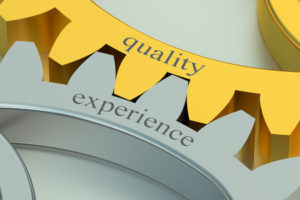There was a time that I wasn’t happy if things were less than perfect. I worked hard to get it perfect. But I would always find another detail that I could improve here and there. The result was that I spent a lot of time improving details that someone else didn’t even notice.

And it didn’t seem to bother other people, when something wasn’t perfect. They were OK with it, but for me it wasn’t good enough.
And when would everything be perfect? Never! So when could I finally be happy? Never? That didn’t seem like a good deal to me. So I knew something had to change. I had to change and I did!
What level of quality do you need in a passion or project?
In the past, my answer to this question would be ‘The highest quality possible’. Many years and a lot of experience later, I know this isn’t the right answer.

Your first question must be: “Who is your client or sponsor?” and it is possible that you are your own client or sponsor. These are the ones that pay to benefit from the result of your project. The next question is then: “What level of quality does the client, the sponsor or you need?”
For example: If you’re playing a musical instrument and you have a concert in your city’s concert hall, you want to give the best concert ever to your audience. But when you are playing for your grandmother and other family members, it doesn’t matter so much if you make a mistake.
A business example: The software for an air plane or a space craft must be of much higher quality than for a computer game. A computer game with defects can lose a customer, but an air plane or space craft with defects can risk the lives of all of its crew and passengers.
Signs you might be wasting time, energy and money
The law of Pareto can be applied to quality as well: It takes 20% of the time to do 80% of the work. To do the other 20% of the work and to get to perfection, it will take up the other 80% of the time. If you’re giving too high quality of work, you’re wasting scarce resources such as time, energy and money.

Mistakes that happen very often:
- Perfectionism: As with my previous self, only perfect was good enough. Often 80% of perfection is still very good. The rest is a waste of your resources.
- Gold plating: Because you are basically a good person or you want to do extra because you like the person for whom you are doing this task, the result is the same: You deliver more than what was asked for. That’s very nice of you, but it comes with a cost: it costs more in time, energy and money, unnecessarily because no one asked for it.
- Be a ‘satisficer’, not a maximiser: Are you one of these people who, in a restaurant is only able to decide what to take after going through the whole menu from A to Z, and the suggestions as well, while all others already decided what to have half an hour ago?
You first need to know all options to be able to decide, even if you already see an option that you like. You are a maximiser but you would win time being a satisficer, that is taking the option you like and stop there instead of looking if an even better option exists. - Liking to do something: That isn’t necessarily wrong, especially in a passion project. But how often are you performing a task for much longer than needed, just because you like it? Again, you’re wasting time and energy (and sometimes money) because you could have finished earlier and spent your resources on something else.
So, it is good practice to define the level of quality that you need before performing a task or executing a project and then, stick to it. That is not so easy but it helps when you’re aware that doing more is just a waste of your precious time, energy and money.
What you can do is to start with a framework, a big overview or a first version and then adding details and more quality gradually, in iterations. Then the challenge is to stop when it’s good enough. It helps when you declare the task ‘officially’ as finished.
I will still always prefer quality over quantity, that’s my personality. But I don’t want to waste my time, energy and money anymore. Now, good enough is good enough!
Your view?

Excellent points here, and I do agree perfectionism can waste a lot of time and resources. I would however, also say that it has its uses:
– An artist will always strive for the very best quality of their work; it’s how they challenge themselves, how they grow. The same goes for athletes.
– When it comes to paying clients, I always try to do my very best, and even add something on for free to wow them. It’s one way of sticking out from the crowd of coaches online.
I believe the important part is to know when to cut and say “that’s good enough now!” It’s a fine balance sometimes between “can be improved in a way that would benefit me/the client” and “wasting time for details nobody notices” 🙂